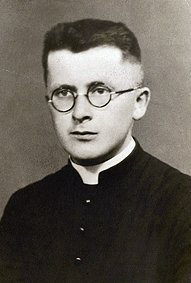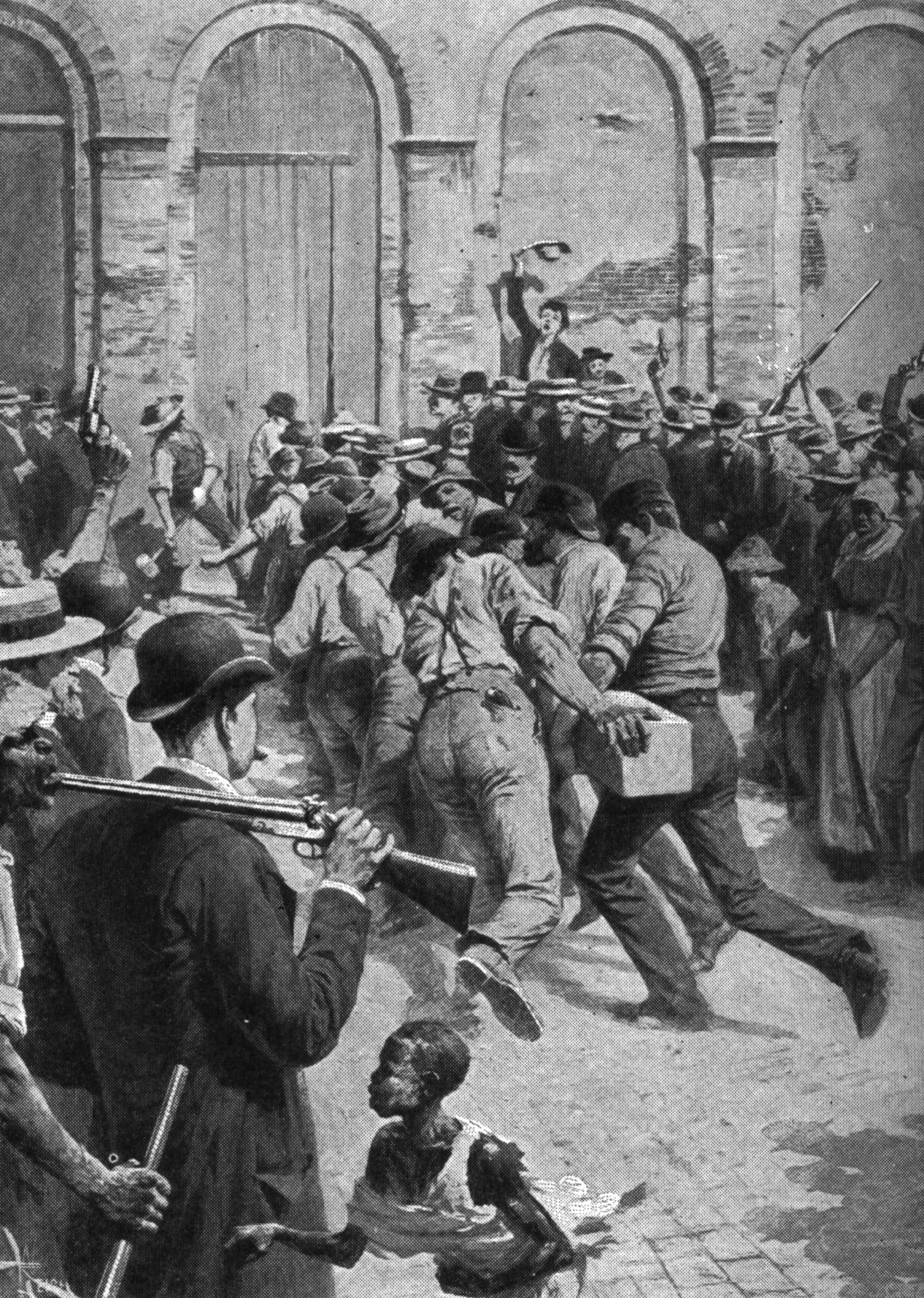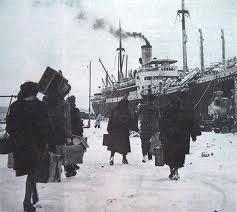|
Francesco Bonifacio
Francesco Giovanni Bonifacio ( – ) was an Italian Catholic priest, killed by the Yugoslav communists in Grisignana (then Italy now Croatia); he was beatified in Trieste on . Early life Francesco (Checco) Bonifacio was born September 7, 1912, in Pirano, Istria which was then part of Austria Hungary, later Italy, and is now part of Slovenia. He was the second of seven children born to Giovanni and Luigia Busdon Bonifacio. His father was a stoker on steamers sailing out of Trieste, which kept him away much of the time. His mother took a job as a cleaning lady to supplement their income. The family were devout Catholics. Francesco attended the local elementary school of Pirano and received religious education at the local parish of San Francesco where he served as an altar boy. Seminarian In 1924, Bonifacio entered the seminary in Capodistria-Koper, where he earned the nickname of ''El Santin'' (the little Saint) for his obedience, meekness, service, and availability to hi ... [...More Info...] [...Related Items...] OR: [Wikipedia] [Google] [Baidu] |
Don Francesco Bonifacio
Don, don or DON and variants may refer to: Places *County Donegal, Ireland, Chapman code DON * Don (river), a river in European Russia * Don River (other), several other rivers with the name *Don, Benin, a town in Benin * Don, Dang, a village and hill station in Dang district, Gujarat, India *Don, Nord, a ''commune'' of the Nord ''département'' in northern France *Don, Tasmania, a small village on the Don River, located just outside Devonport, Tasmania *Don, Trentino, a commune in Trentino, Italy * Don, West Virginia, a community in the United States *Don Republic, a temporary state in 1918–1920 *Don Jail, a jail in Toronto, Canada People Role or title * Don (honorific), a Spanish, Portuguese, and Italian title, given as a mark of respect *Don, a crime boss, especially in the Mafia , ''Don Konisshi'' (コニッシー) *Don, a resident assistant at universities in Canada and the U.S. *University don, in British and Irish universities, especially at Oxford, Cambridge, ... [...More Info...] [...Related Items...] OR: [Wikipedia] [Google] [Baidu] |
Novigrad, Istria County
Novigrad ( it, Cittanova) is a town in Istria County in western Croatia. It is also sometimes referred to as Novigrad Istarski () to distinguish it from three other Croatian towns of the same name. Novigrad is set on a small peninsula on the western coast of Istria, north of the mouth of the river Mirna and some south of the border with Slovenia. At the 2011 census the town proper had a population of 2,622, while the administrative area – which also includes four nearby villages – had 4,345 inhabitants. 66% of population were ethnic Croats while the biggest minority group were Istrian Italians (10%). History There was an ancient city in the broad area of what is now Novigrad, which was called Aemona. In the 5th-6th centuries Novigrad was called ''Neapolis'' (Greek Νεάπολις). From the early Middle Ages and right up until 1828 it was the seat of the Diocese of Novigrad, which has been identified with the Ancient see of Aemona and nominally restored as Latin Cathol ... [...More Info...] [...Related Items...] OR: [Wikipedia] [Google] [Baidu] |
Italian Murder Victims
Italian(s) may refer to: * Anything of, from, or related to the people of Italy over the centuries ** Italians, an ethnic group or simply a citizen of the Italian Republic or Italian Kingdom ** Italian language, a Romance language *** Regional Italian, regional variants of the Italian language ** Languages of Italy, languages and dialects spoken in Italy ** Italian culture, cultural features of Italy ** Italian cuisine, traditional foods ** Folklore of Italy, the folklore and urban legends of Italy ** Mythology of Italy, traditional religion and beliefs Other uses * Italian dressing, a vinaigrette-type salad dressing or marinade * Italian or Italian-A, alternative names for the Ping-Pong virus The Ping-Pong virus (also called Boot, Bouncing Ball, Bouncing Dot, Italian, Italian-A or VeraCruz) is a boot sector virus discovered on March 1, 1988, at the '' Politecnico di Torino'' (Turin Polytechnic University) in Italy. It was likely the ..., an extinct computer virus See also ... [...More Info...] [...Related Items...] OR: [Wikipedia] [Google] [Baidu] |
Italian Beatified People
Italian(s) may refer to: * Anything of, from, or related to the people of Italy over the centuries ** Italians, an ethnic group or simply a citizen of the Italian Republic or Italian Kingdom ** Italian language, a Romance language *** Regional Italian, regional variants of the Italian language ** Languages of Italy, languages and dialects spoken in Italy ** Italian culture, cultural features of Italy ** Italian cuisine, traditional foods ** Folklore of Italy, the folklore and urban legends of Italy ** Mythology of Italy, traditional religion and beliefs Other uses * Italian dressing, a vinaigrette-type salad dressing or marinade * Italian or Italian-A, alternative names for the Ping-Pong virus, an extinct computer virus See also * * * Italia (other) * Italic (other) * Italo (other) * The Italian (other) * Italian people (other) Italian people may refer to: * in terms of ethnicity: all ethnic Italians, in and outside of Ita ... [...More Info...] [...Related Items...] OR: [Wikipedia] [Google] [Baidu] |
1946 Deaths
Events January * January 6 - The first general election ever in Vietnam is held. * January 7 – The Allies recognize the Austrian republic with its 1937 borders, and divide the country into four occupation zones. * January 10 ** The first meeting of the United Nations is held, at Methodist Central Hall Westminster in London. ** ''Project Diana'' bounces radar waves off the Moon, measuring the exact distance between the Earth and the Moon, and proves that communication is possible between Earth and outer space, effectively opening the Space Age. * January 11 - Enver Hoxha declares the People's Republic of Albania, with himself as prime minister. * January 16 – Charles de Gaulle resigns as head of the French provisional government. * January 17 - The United Nations Security Council holds its first session, at Church House, Westminster in London. * January 19 ** The Bell XS-1 is test flown for the first time (unpowered), with Bell's chief test pilot Jack W ... [...More Info...] [...Related Items...] OR: [Wikipedia] [Google] [Baidu] |
1912 Births
Year 191 ( CXCI) was a common year starting on Friday (link will display the full calendar) of the Julian calendar. At the time, it was known as the Year of the Consulship of Apronianus and Bradua (or, less frequently, year 944 '' Ab urbe condita''). The denomination 191 for this year has been used since the early medieval period, when the Anno Domini calendar era became the prevalent method in Europe for naming years. Events By place Parthia * King Vologases IV of Parthia dies after a 44-year reign, and is succeeded by his son Vologases V. China * A coalition of Chinese warlords from the east of Hangu Pass launches a punitive campaign against the warlord Dong Zhuo, who seized control of the central government in 189, and held the figurehead Emperor Xian hostage. After suffering some defeats against the coalition forces, Dong Zhuo forcefully relocates the imperial capital from Luoyang to Chang'an. Before leaving, Dong Zhuo orders his troops to loot the tombs of ... [...More Info...] [...Related Items...] OR: [Wikipedia] [Google] [Baidu] |
Anti-Italianism
Anti-Italianism or Italophobia is a negative attitude regarding Italian people or people with Italian ancestry, often expressed through the use of prejudice, discrimination or stereotypes. Its opposite is Italophilia. In the United States Anti-Italianism arose among some Americans as an effect of the large-scale immigration of Italians to the United States during the late-nineteenth and early-twentieth centuries. The majority of Italian immigrants to the United States arrived in waves in the early-twentieth century, many of them from agrarian backgrounds. Nearly all the Italian immigrants were Roman Catholic, as opposed to the nation's Protestant majority. Because the immigrants often lacked formal education, and competed with earlier immigrants for lower-paying jobs and housing, significant hostility developed toward them. The established Protestant Americans of Northern European ancestry aggressively displayed and acted upon ethnocentric chauvinism and prejudice against It ... [...More Info...] [...Related Items...] OR: [Wikipedia] [Google] [Baidu] |
Ethnic Cleansing
Ethnic cleansing is the systematic forced removal of ethnic, racial, and religious groups from a given area, with the intent of making a region ethnically homogeneous. Along with direct removal, extermination, deportation or population transfer, it also includes indirect methods aimed at forced migration by coercing the victim group to flee and preventing its return, such as murder, rape, and property destruction. It constitutes a crime against humanity and may also fall under the Genocide Convention, even as ''ethnic cleansing'' has no legal definition under international criminal law. Many instances of ethnic cleansing have occurred throughout history; the term was first used by the perpetrators as a euphemism during the Yugoslav Wars in the 1990s. Since then, the term has gained widespread acceptance due to journalism and the media's heightened use of the term in its generic meaning. Etymology An antecedent to the term is the Greek word (; lit. "enslavement"), which was ... [...More Info...] [...Related Items...] OR: [Wikipedia] [Google] [Baidu] |
Istrian–Dalmatian Exodus
The Istrian–Dalmatian exodus (; ; ) was the post-World War II exodus and departure of local ethnic Italians (Istrian Italians and Dalmatian Italians) as well as ethnic Slovenes, Croats, and Istro-Romanians from the Yugoslav territory of Julian March ( Karst Region and Istria), Kvarner and Dalmatia, towards Italy, and in smaller numbers, towards the Americas and Australia. These regions were ethnically mixed, with long-established historic Croatian, Italian, and Slovene communities. After World War I, the Kingdom of Italy annexed Istria, Kvarner, the Julian March and parts of Dalmatia including the city of Zadar. At the end of World War II, under the Allies' Treaty of Peace with Italy, the former Italian territories in Istria, Kvarner, the Julian March and Dalmatia were assigned to the nation of Yugoslavia, except for the Province of Trieste. The former territories absorbed into Yugoslavia are part of present-day Croatia and Slovenia. According to various sources, the exod ... [...More Info...] [...Related Items...] OR: [Wikipedia] [Google] [Baidu] |
Foibe Massacres
The foibe massacres (; ; ), or simply the foibe, refers to mass killings both during and after World War II, mainly committed by Yugoslav Partisans and OZNA in the then-Italian territories of Julian March (Karst Region and Istria), Kvarner and Dalmatia, against the local ethnic Italian population (Istrian Italians and Dalmatian Italians), as well the ethnic Slovenes, Croats and Istro-Romanians who chose to maintain Italian citizenship, against all anti-communists, associated with Fascism, Nazism and collaboration with Axis, and against real, potential or presumed opponents of Tito communism. The type of attack was state terrorism, reprisal killings, and ethnic cleansing against Italians. The Yugoslav partisans intended to kill whoever could oppose or compromise the future annexation of Italian territories: as a preventive purge of real, potential or presumed opponents of Tito communism (Italian, Slovenian and Croatian anti-communists, collaborators and radical nationalists ... [...More Info...] [...Related Items...] OR: [Wikipedia] [Google] [Baidu] |
Foiba
A foiba (from Italian: ; plural: foibe or foibas) — ''jama'' () in South Slavic languages scientific and colloquial vocabulary (borrowed since early research in the Western Balkan Dinaric Alpine karst) — is a type of deep natural sinkhole, doline, or sink, and is a collapsed portion of bedrock above a void. Sinks may be a sheer vertical opening into a cave, or a shallow depression of many hectares. They are common in the Karst (Carso) region shared by Italy and Slovenia, as well as in a karst of Dinaric Alps in Bosnia and Herzegovina, Montenegro and Croatia. The foibe massacres, a war crime that took place during and after the World War II, take their name from the foibe. Etymology The Italian name "foiba" derives from Friulan "''foibe''", which in turn derives from the Latin ''fŏvea'' (meaning "pit" or "chasm"). The oldest document on which it is reported is an official report in 1770, written by the Italian naturalist Alberto Fortis, who wrote a series of books on t ... [...More Info...] [...Related Items...] OR: [Wikipedia] [Google] [Baidu] |





